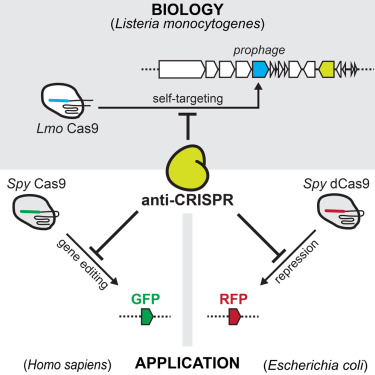Novel Small Protein Inhibitors for Rapid and Controllable CRISPR-Cas9 Interference
Invention Novelty
This invention identifies a novel class of natural protein-based inhibitors of CRISPR-Cas9, which could eliminate off-target effects of Cas9-mediated gene editing. It also presents an attractive antibiotic strategy and a potential biodefense agent against CRISPR bioterror threat.
Value Proposition
CRISPR-Cas9 gene editing has been used in many areas of research and developed as novel therapies to treat genetic disorders. However, off-target effects are frequently documented and present a major barrier to medical applications. For example, the effects likely result from prolonged expression of Cas9 in the nuclei of cells, which increase the probability that the Cas9 guide RNA would base pair with an imperfect site and cause oncogenic or fatal mutations. A co-expressed Cas9 inhibitor protein will provide an effective tool to rapidly neutralize this possibility and maintain the genetic stability. Currently, there are no proteins known to inhibit the most widely used Streptococcus pyogenes (Spy) Cas9. Using a bioinformatics approach, UCSF investigators have identified two natural Spy Cas9 inhibitors. This presents for the first time a controllable “off-switch” for Spy Cas9-mediated DNA cleavage and could eliminate off-target effects by limiting the length of time that Cas9 is functional. These inhibitors can also limit the antiviral function of CRISPR-Cas9 in bacterial pathogens and provide a new antibiotic strategy.
The current invention provides the following advantages:
- First protein-based inhibitors that bind rapidly and tightly to Spy Cas9 and dissociate slowly
- Express well in human cells and easy to use in a controllable manner to inhibit non-specific gene editing
- Small protein inhibitors that can be easily delivered and travel through the nuclear membrane
- Function on the natural version of Cas9 that eliminates the labor-intensive manipulations of guide RNA or Cas9 protein
- Compatible with ‘split’ and drug-inducible Cas9 systems
Technology Description
There are currently no counter measures to the widely used CRISPR-Cas9 system. Therefore, investigators at UCSF have recently searched cas9-containing bacterial genomes for the co-existence of a CRISPR spacer and its target, a potential indicator for CRISPR inhibition. This analysis led to the discovery of four unique type II-A CRISPR-Cas9 inhibitor proteins encoded by Listeria monocytogenes prophages, two of which also blocked the wild-type Spy Cas9 when assayed in both E. coli and human cells. These natural Cas9-specific ‘‘anti-CRISPRs’’ are small proteins of 60-150 amino acids, and present tools that can be broadly used to regulate the genome engineering activities of the CRISPR-Cas9 system.

Looking for Partners
To develop & commercialize the technology as a tool to regulate the CRISPR-Cas9 system for gene therapy and antibacterial therapeutics, and as a biodefense strategy against CRISPR bioterror threat
Stage of Development
Pre-Clinical
Related Materials
Data Availability
Under CDA / NDA
Patent Status
| Country | Type | Number | Dated | Case |
| United States Of America | Issued Patent | 11,485,760 | 11/01/2022 | 2017-057 |
Additional Patent Pending
Contact
- Catherine Smith
- Catherine.Smith2@ucsf.edu
- tel: View Phone Number.
Inventors
- Bondy Denomy, Joseph W.
- Rauch, Benjamin J.
Other Information
Keywords
CRISPR-Cas9, Small protein inhibitors, Gene editing, Off-target effects, Human cells, Antibacterial, Biodefense
